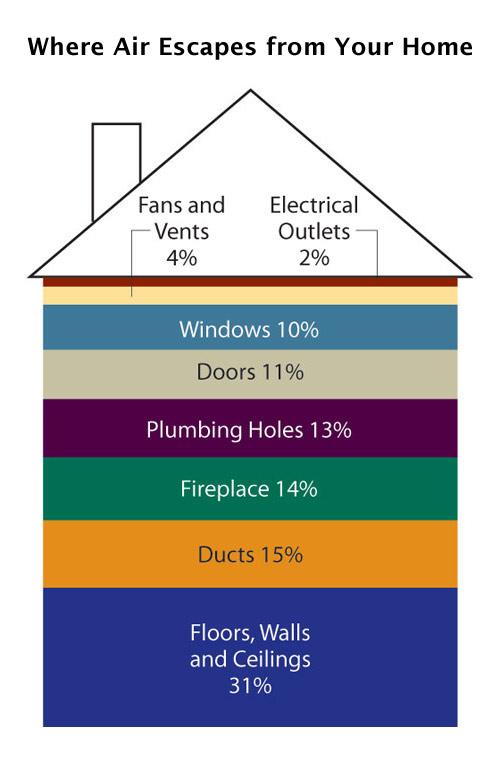
Editor's note: This article was sponsored by Flyhomes.
It’s hard to get everyone in the family to use the recycling bin correctly, but most of the time, lifestyle changes like these are the only way to be more environmentally friendly. Roughly one-third of your personal environmental footprint comes from the energy used in your home. So, when you move, adding energy efficiency to your house-hunting criteria can translate into positive offsets to your family’s environmental impact. And the home efficiency upgrades you make today just might help you sell your house in the future.
Insulation and windows
Whether you are buying or selling a house, when it comes to home efficiency, the first thing you should think about is insulation. Because most insulation is hidden in walls and attics, it’s easy to overlook when prospective buyers are touring homes. But home heating and cooling generate about half of your home’s environmental footprint, so proper insulation can have a big impact on a home’s efficiency and comfort.
“It’s all about air pressure balance — the balance between the temperature outside and the temperature inside your home. Heat’s always trying to escape,” says Bryan Hively, a home tour specialist team lead and licensed home inspector at Flyhomes real estate company (flyhomes.com). When warm air escapes your home, cool air from outside takes its place, forcing your heating system to work harder. Insulating your floors, walls and ceilings can cut air leakage by nearly a third; sealing ducts will reduce the leakage by another 15 percent. Altogether, sealing air leaks can save up to a quarter of your heating and cooling costs year around. In a hot market like Seattle, it’s not necessary to spend a lot of money on home improvements before selling, but adding insulation is something many homeowners can do themselves as a simple way to boost the asking price.

“Windows and insulation are a way to basically dress your house, or wrap it in a warm blanket,” says David Isaac, also a tour specialist and licensed home inspector at Flyhomes. Windows account for about 10 percent of the air leakage in a home. They also have a tremendous impact on your home’s aesthetics and can be expensive enough to replace to spook a prospective buyer. If a home has single-pane windows — especially if the frames are aluminum — they should be replaced, or the house should be priced with that upgrade expense in mind.
HVAC systems
In Seattle, homes use a variety of energy sources, including natural gas, electricity and even oil. All of these sources have advantages and disadvantages: Gas and oil are efficient but nonrenewable; electricity is cleaner but less efficient. Whichever heat source you prefer, switching from one to another may not be cost-effective. Upgrading to a newer system is another big expense that you might not need to make.
“The efficiency of your heating and cooling system is not necessarily about it being older or newer. Your furnace and air conditioning systems need to be serviced the same way you service your car regularly to keep them working well,” says Isaac.
Regardless of heating method, it’s good for a house to have a gas connection. After HVAC systems, water heaters use the most energy in a home. Tankless gas water heaters are the most efficient water-heating option. And converting fireplaces from wood-burning to gas not only makes for a cheaper, cleaner fire, it reduces air leaks through the chimney even when your fireplace is not in use.
Although it’s not very common in our region, solar power is another possible energy option for Pacific Northwest homeowners. The cost of solar panels is dropping; there are hefty rebates for homeowners who install them; and grid intertie systems can even result in the utility company paying you for part of the year. However, your home must be properly situated for solar power to make sense. A home in a grove of tall trees or one that backs up against the north face of a hill would not be a good purchase for someone who wants to install solar power.
Appliances
All of your home’s appliances add up to about 15 percent of your home’s energy use, so they have a lot less impact on a home’s efficiency than insulation does. But whether you’re buying or selling, upgrading them makes sense. Modern appliances are much more efficient than those made a couple of decades ago. Energy Star–certified appliances meet still higher efficiency standards, saving even more money on the utility bills. If you can’t afford to replace everything, the washer and dryer, followed by the refrigerator, are the biggest energy hogs.
Like windows, appliances also have visual impact. While you want your home to be memorable to buyers, you need that memory to be a pleasant one.
“Newer appliances make a significantly different impression. If you walk into a home with 30-year-old appliances, it’s one of those things that will stick with you — Oh, that was the house with the old appliances,” says Isaac. A few thousand dollars spent on new appliances is insignificant compared to the cost of a home, but a good first impression can be priceless.
The bottom line
Efficiency is important, but Hively and Isaac agree that it’s rarely a deal breaker, especially in our region’s hot market.
“I think the local market is so crazy, people are just buying anything they can get right now. Doing a lot of work to your home just to sell it doesn’t always financially make much sense,” says Hively. Instead, it’s better to save the money for improvements on the home you plan to stay in.
“You can change things like appliances, but some of the really significant factors — neighborhoods and schools — you can’t,” says Isaac. When you’re house hunting, consider efficiency, but prioritize the things you can’t change. Energy efficiency probably isn’t a reason not to make an offer on a house unless you really can’t afford the price of a house plus the upgrades you wish to make. And remember that homeownership, like environmental sustainability, requires long-term thinking. Whether it’s paying a little more for an energy-efficient home or spending money on upgrades once you’ve moved in, you will see the return on your investment for years to come.
|
Sponsored by: Flyhomes helps people buy homes they love with less stress and more celebration along the way. Experience next-level teamwork and door-opening financial products that help buyers stand out in competitive real estate markets. |
|
|












